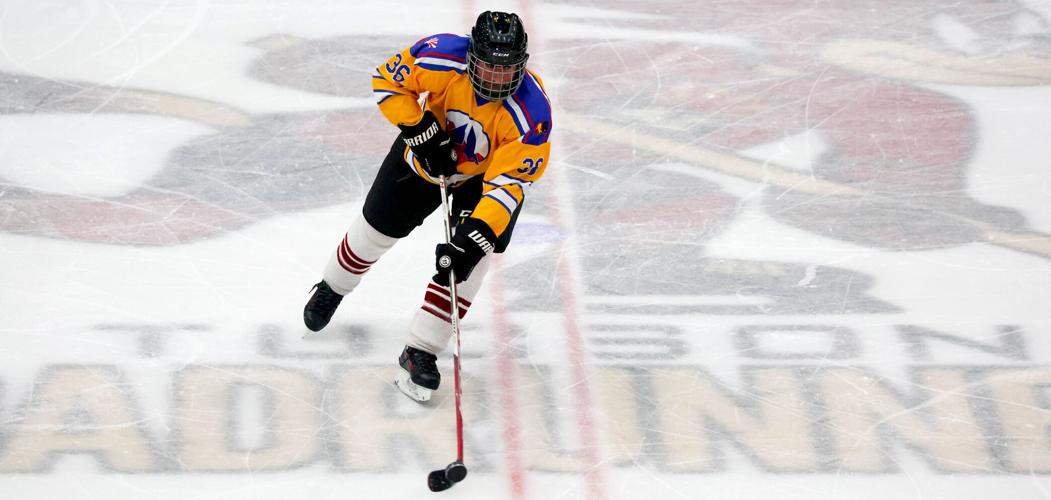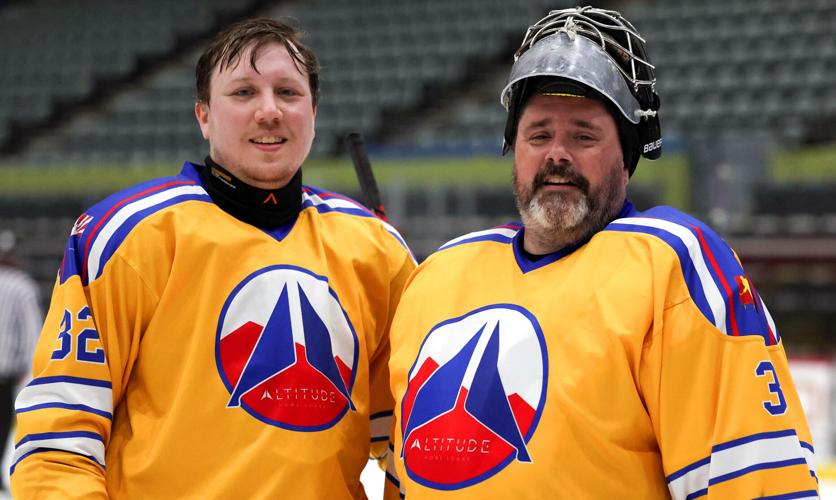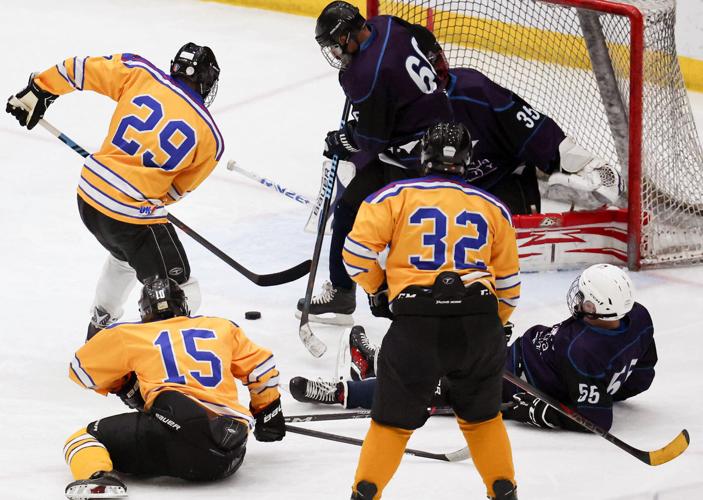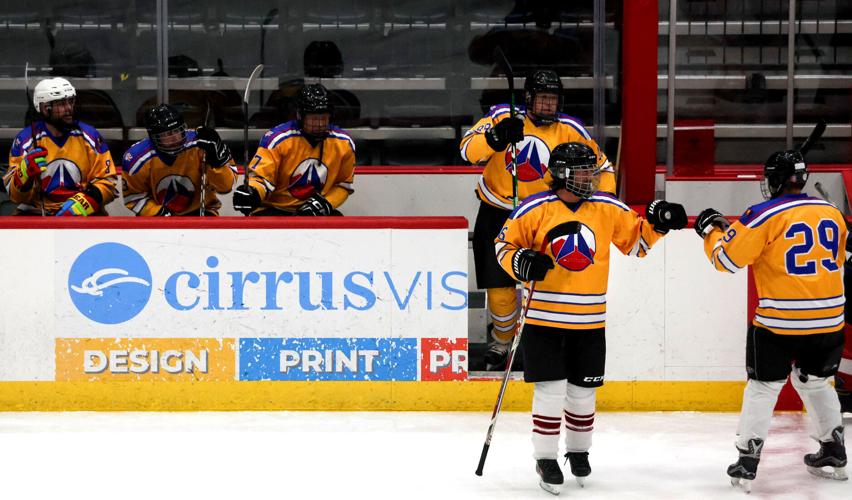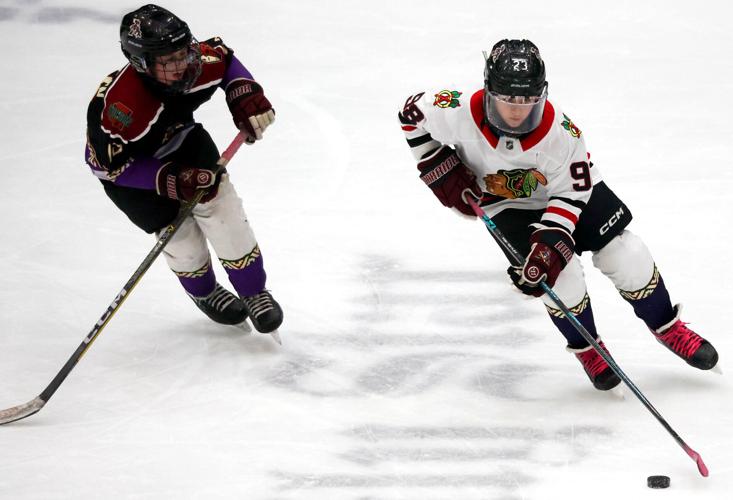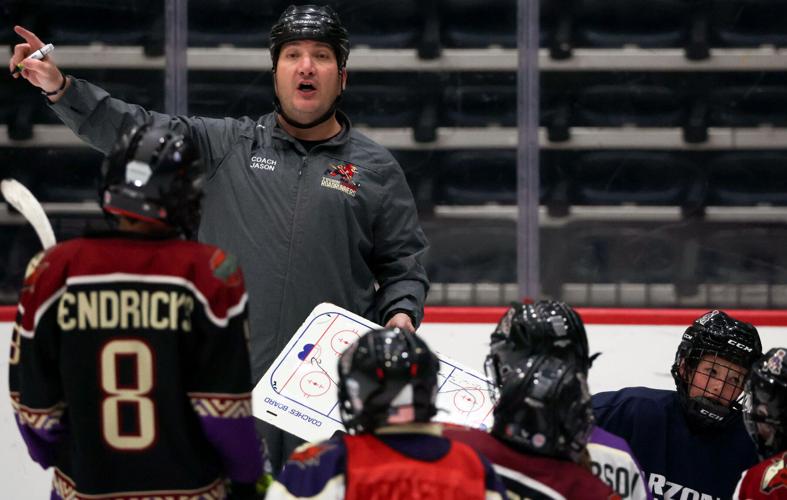It’s a little after 8:30 p.m. on a Friday night, and Tucson Arena is the coolest place to be — literally.
While the air temperature of the Tucson Arena ice rink may be between a brisk 50 and 60 degrees, things are just heating up as the Tucson Adult Hockey League is about to hit the ice for its first games back since the league’s brief holiday break.
As the clock ticks toward the 8:40 p.m. start time of the night’s first game, the Altitude Home Loans hockey team sits in their makeshift locker room behind the arena’s ice rink, prepping for their match against the Tierra Antigua Realty hockey team.
Behind the black curtains of the locker room, players put on their protective padding, shin guards and banana yellow jerseys before lacing up their skates. Among the night’s players are the father-son duo Chris Faulk Sr., 49, and Chris Faulk Jr., 29, lifelong hockey fans who have been a part of the league for several years.

Chris Faulk Jr., left, poses for a photo with his father Chris Faulk Sr. after Altitude Home Loans defeated Tierra Antigua Realty at the Tucson Arena, Jan. 3, 2024.
“It’s everything. It’s what keeps me going, keeps me young, keeps me connected to him,” Faulk Sr. said. “I don’t know that I would still go through all of this if not for the chance to connect and share things with him. That’s the biggest thing.”
Immediately after Faulk Sr. finishes speaking about what competing with his son means to him, the entire team jokingly bursts into a collective “Aww.”
The team’s response is playful and a little sarcastic but showcases the fun personalities of those who dedicate time out of their busy schedules to play a game or two of hockey every week.
Even though the arena itself is nearly empty (with only eight spectators in the seats) for the night’s games, you’ll often hear the sound of hockey sticks hitting the floor as the puck barrels into the net, followed by the players’ bench erupting into applause and shouts as one of the players successfully makes a shot.
By 9:10 p.m., Altitude has two on the board as Tierra Antigua trails with zero in the first period.

Peter Cronin (66) defends the Tierra Antigua Realty goal from Randy Bogan (29) during the match at the Tucson Arena, Jan. 3, 2024.
Less than 10 minutes later, Tierra Antigua comes back with a (short-lived) vengeance and scores in the second period. Altitude scored two goals in the second period, ending the period 4-1.
Altitude scored twice in the final period and ultimately skated off with a 6-1 win over Tierra Antigua by 10 p.m.
But it’s not all about winning.
Many, including retired couple Stacy and Brian Dawson, who make the drive from Saddlebrooke multiple times a week, play just because they love it.
“Our goal is No. 1, nobody gets hurt. No. 2, everybody has fun,” Brian Dawson said shortly before the game. “We’ve been pretty successful in meeting those goals so far … Everybody likes to win and all that, but at the end of the day everybody is smiling and laughing. … It’s one of those sports where you’re really tired after a minute out there and you’re exhausted and sweating and then you just can’t wait to get back out there again.”
The love of hockey has driven many Tucsonans back to the ice in various ways over the last couple of years, including Mike Jaret-Schachter, who now dons the black-and-white pinstripes.
Jaret-Schachter began playing ice hockey when he was just 9 years old. In the 1990s, he joined the old Tucson Hockey Club that played at the Tucson Convention Center.
He continued playing youth travel hockey until his mid-20s when he could no longer afford to play, he says. At that point, Tucson didn’t have a public ice rink, so he pivoted to roller hockey, which he’s been playing for around 15 years now.
However, his first love was always ice hockey.
He eventually became interested in officiating hockey games and even used to referee adult games at the former Gateway Ice Center located near East Speedway and North Kolb Road.
“It’s very humbling to officiate hockey,” he said.
Over the last several years, Jaret-Schachter, who runs a video game design studio, has had an on-again, off-again relationship with officiating hockey games.

Altitude players fist bump while switching their lineup during the game against Tierra Antigua at the Tucson Arena, Jan. 3, 2024.
Until he reconnected with Tucson Adult Hockey League co-founder Danny Plattner who regularly asked Jaret-Schachter if he could officiate games due to a lack of referees in the area. The need for referees became even more prominent following the COVID-19 pandemic, as there was only one certified hockey official in Tucson: Plattner.
Tucson hockey community highlights local diversity
Plattner is a key figure in keeping recreational hockey in Tucson.
Even on a Friday night, he’s the last one to leave the ice as he helps clean up before the next game at 10:05 p.m. Not because he has to, but because he wants to.
He plays, he referees, he organizes games and so much more, all because he genuinely loves the game and its passionate community.
Plattner recalls falling in love with ice hockey at just 5 years old when his dad took him to see a St. Louis Blues game for the first time.
“I was like, ‘This is the greatest thing I’ve ever seen’ and I’ve been involved in it ever since,” he said.
So, when Tucson’s only public ice rink shut down around 2007, Plattner knew he couldn’t just let hockey in Tucson shut down, too. With some help from his friend Pat McDonagh, the Tucson Adult Hockey League was born.
“We were like ‘Let’s just start a league,’” Plattner said. “And we started with 14 (people) at that time. We didn’t have a lot, we didn’t want to expect anything, but it just evolved. And so people were so desperate to get in our league, they were running to my house with checks in their hands or cash. At that time, we wanted to continue things. We just figured we’ll do it for a few years and at some point, either, somebody else will take over or a rink will open up.”
A few years have turned into several and now the league has grown to approximately 350 players divided into 23 teams in three tiers. They also have a waiting list with nearly 20 people.
League members are Tucsonans of all ages and backgrounds, including teachers, doctors, insurance agents and first responders.
The registration period is about to open up for the 2025 spring season, which runs from February to April. All new players have to go on the waiting list until a spot opens up for a team.
The spring season fee of $250 covers six games with the league and a jersey. The fall season costs around $450 for 12 games.
Due to rink availability, many of the league’s games have late start times throughout the week, including its latest start time at 11:20 p.m. on Tuesdays.
If you’re wondering why the game times are so late, that’s just the pecking order of ice time at the Tucson Arena. The Tucson Roadrunners come first, followed by the UA hockey teams, leaving the Tucson Adult Hockey League with whatever times they can have.
“It’s a pretty well-run hockey league for what we have. We have very limited ice time, but have a very large community here,” Jaret-Schachter said. “The league is packed to the brim at all levels to level three … and there’s a waiting list for all of the levels. It’s a lot of work and they do a really good job of keeping it running.”

Tucson Junior Roadrunners U12-U14 players compete during practice at the Tucson Arena, Jan. 3, 2024.
As time has gone on, local hockey enthusiasts wanted to pass down that love for the game to local kids which led to the development of the Wildcat Youth Hockey Association and the Tucson Junior Roadrunners team.
During their evening practices (or when ice time is available), you’ll see at least a few dozen kids dressed in their full Junior Roadrunners uniforms, complete with a roadrunner kachina, just like the Tucson Roadrunners’ jerseys.
The program includes hundreds of kids ages 5 to 18. Member fees for the junior league range from $525 to $650 a season.
“Our goal and mission is to create a fun environment for kids to learn and fall in love with the game and become lifelong hockey players at whatever level that they want to play,” said Dave Honecker, the Tucson Junior Roadrunners president. “And that’s what’s been the driver for our organization.”
Much like the adult league, the staff behind the Tucson Junior Roadrunners come from diverse backgrounds, too. Jason Renda, the head coach of the 12U/14U travel team, grew up in upstate New York and played hockey in high school. He’s celebrating his 30th year in the United States Air Force.

Coach Jason Renda explains a drill to his U12-U14 players during practice at the Tucson Arena, Jan. 3, 2024.
During his time with the Tucson Junior Roadrunners, they’ve won two state championships and tournaments the program has never won before, he says.
“It’s been great. It’s been great watching the kids grow, not only as players but as people and watching them progress and learning how to lose, learning how to win,” Renda said. “When you have a pretty decent win streak, you want the kids to ground themselves a little better, so learning how to lose is just as important as learning to win and it builds character. So, it’s been an interesting ride the past couple of years and we’ve had a lot of success this year.”
Aside from the leagues being a success, there’s one other thing that every hockey enthusiast can agree on — Tucson needs more ice rinks.
Final piece of the mosaic
Tucson is set to gain not one, but three more ice rinks when the Mosaic Quarter Iceplex opens near the Kino Sports Complex (on the north side of Interstate 10) in 2027.
The 175,000-square-foot three-rink ice center is a part of the larger Mosaic Quarter project, which will include a multi-sport facility, stadium, entertainment pavilion, three hotels and 10 restaurants.
Phase one of the privately-funded project, which includes the Mosaic Quarter Iceplex, was approved by the Pima County Board of Supervisors last year. They officially broke ground on the project in November 2024.
“Once completed, Mosaic Quarter Phase One is projected to generate $8.3 billion of new local spending in addition to $917.7 million in tax revenue for the State of Arizona, City of Tucson and the Regional Transportation Authority,” according to the Pima County website. The project will also support 92,300 community jobs.
Once the ice center is completed, the University of Arizona men’s hockey team will officially call Mosaic Quarter its new home. Following suit, the Tucson Adult Hockey League and Tucson Junior Roadrunners will move from Tucson Arena to the new ice center, too.

Bob Beecher (36), a player on the Altitude Home Loans team moves the puck down ice during the match against Tierra Antigua realty at the Tucson Arena, Jan. 3, 2024.
Plattner, who has been in contact with the contractors for several years, is a fervent supporter of the project. He even composed a community support statement for the Board of Supervisors citing the positive impact Mosaic Quarter will have on “generations of Pima County children and their parents, for years to come.”
The first phase of the project is estimated to be completed by 2026, with a grand opening of the Mosaic Quarter Iceplex in the spring or summer of 2027.
“At Mosaic Quarter, I see our organization continuing to flourish there and grow and more ice will generate an opportunity for an organization, whether it’s part of our organization or something run by the Mosaic Quarter group, to have something that looks more like the hockey groups in Phoenix,” Honecker said. “We feel that there’s a place in Tucson and in Arizona for youth hockey at an affordable level, for a broad spectrum of kids, where we can have a house league and we can run travel programs that compete at a certain level and keep the cost manageable so that anybody who wants to play can partake in that.”


